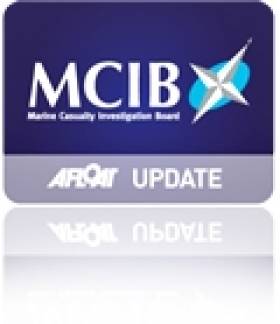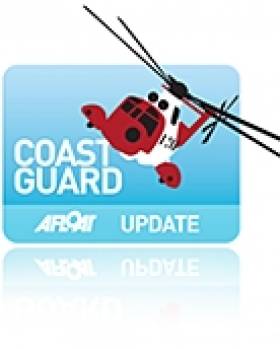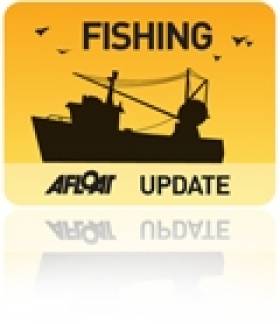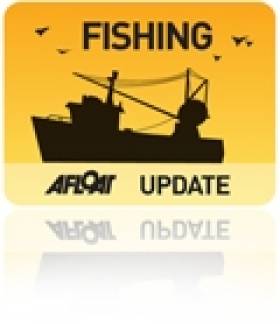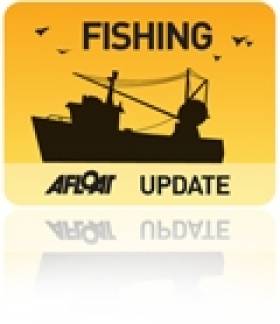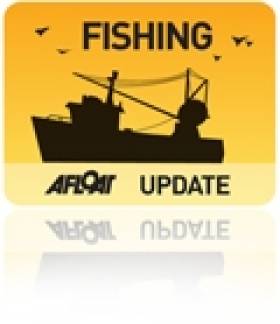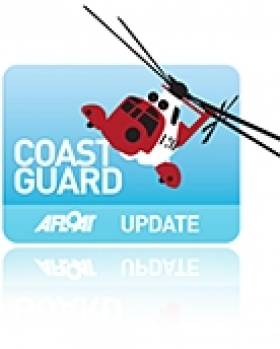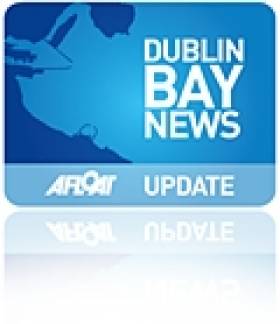Displaying items by tag: Fishing
Neglect of Safety Procedures Led To Leg Injury on Fishing Vessel - MCIB
#MCIB - The dangers of performing maintenance tasks on boats while machinery is running have been highlighted in the official investigation into an accident on a fishing vessel off Erris Head in Co Mayo last year.
The skipper of the MFV James Collins was seriously injured when his leg was caught in the vessel's propeller shaft while attempting to clear debris from the bilge pump on the morning of 20 April 2012.
Jonathan O'Donnell, aged 26 at the time, suffered significant soft tissue damage to his left leg and broke his trivia, fibia and ankle in the incident. Luckily the leg did not require amputation and he is expected to make a full recovery.
The report into the incident by the Marine Casualty Investigation Board (MCIB) found that the vessel's bilge pump was located in the hold adjacent to the propeller shaft, with access to both prevented by the same covering boards.
When O'Donnell responded to a persistent bilge alarm, he did not put the engine on stop or into neutral and the propeller shaft remained turning when he removed the covering boards to access the pump.
As he put his foot into the bilge beside the shaft in order to reach down and clear debris, his waterproof leggings were caught by the coupling on the shaft and his leg was round around it twice.
The MCIB noted the quick actions of the vessel's crew and the prompt attendance of RNLI lifeboat and Irish Coast Guard helicopter crews as instrumental in O'Donnell receiving swift treatment and not losing his leg.
However, the report also pointed to a lack of attention to proper safety precautions on board, nothing that the skipper was "too intent on solving the bilge pump problem" and that he "neglected basic safety procedures" by not stopping all machinery before accessing the bilge as set out in the Code of Practice for Fishing Vessels.
The report concluded that the "ease with which debris could enter the bilge and block the pump suction" was a contributing factor to putting the skipper in his predicament at the time, and also referenced the ease with which loose-fitting clothing like waterproofs can be snagged on turning machinery.
Moreover, the screening of the propeller shaft by covering boards also used to access the bilge pump did not present adequate protection "enabling it to be easily exposed and present a hazard".
The MCIB recommends that the Code of Practice be amended to highlight the danger of accessing the bilge area when shafts are rotating, and to include assessment of sole boards in fish holds to prevent debris passing through to the bilge tank. The complete report is available to download below.
Search for Missing Spanish Fisherman Off Southwest
#Coastguard - The Irish Coast Guard's Rescue 115 helicopter was tasked overnight to search for a missing Spanish fisherman who fell overboard from his fishing trawler off the southwest coast in the early hours of this morning.
98FM is reporting the latest news on this incident, saying that the man went into the sea some 25 miles off Mizen Head.
The alarm was raised around 4am and the coastguard station at Valentia is co-ordinating the search and rescue effort, with RNLI lifeboats from Baltimore and Castletownbere in West Cork assisting.
Marine Minister Welcomes Vote on Common Fisheries Policy Reform
#CFPReform - Minister for the Marine Simon Coveney, in his capacity as President of the European Council of Fisheries Ministers, last week welcomed the vote by the European Parliament on the reform agenda for the Common Fisheries Policy (CFP) which has been prioritised for delivery by the Irish EU presidency.
The vote, which is seen a major step forward in the CFP reform process, follows the minister’s address to parliament on Tuesday last. At the address the minister appealed for all parties to work together towards an agreed CFP reform package to be delivered during the period of Ireland’s presidency.
These reforms, which prioritise long term sustainability of fishing stocks, elimination of the controversial practice of discards (dumping at sea) and a switch to long-term (scientifically based) planning for fisheries, were approved by the parliament on Wednesday 6 February.
The decision of the parliament follows the minister’s address last Tuesday during which he identified the reforms as a major priority on the Irish Government’s EU presidency agenda.
Minister Coveney stated: “I am delighted that the parliament has today decided to back these necessary and timely reforms to the Common Fisheries Policy and that the case for reform outlined in my recent address has been accepted in an agreed manner.
"I am particularly encouraged that this vote has occurred during the Irish EU Presidency. This shows the pivotal role which Ireland can play in influencing broader European Policy and in bringing together divergent views towards an agreed reform package for the CFP.
"Ireland has set out an ambitious work programme aimed at delivering an agreed reform package for the CFP by the end of June. This objective can only be realised if [European] Parliament, Council and the Commission work together focusing on the bigger picture of an agreed reform agenda to benefit all of Europe’s citizens.”
During his address to the plenary session of European parliamentarians, Minister Coveney expressed his view that a momentum was now gathering behind the drive to deliver an agreed reformed CFP package by the end of June.
Acknowledging to the parliament that he had set out an ambitious work programme for his presidency, the minister accepted that differences remain between the European Council and Parliament, particularly on the question of multi-annual fisheries plans.
Minister Coveney emphasised the significant areas of common ground between both institutions and his belief that this would eventually lead to an agreed way forward on most aspects of the reform package. He stressed that it was only in a framework of mutual cooperation and flexibility that the objective of a reformed CFP which prioritises long term fisheries sustainability could be delivered in the lifetime of the current Irish Presidency.
The minister acknowledged the challenges ahead and emphasised the importance for the EU Parliament, Council and Commission to work together on all the issues including delivering on maximum sustainable yield, the elimination of discards and regionalisation.
Following an exchange of views, the minister sought support for his objective of achieving political agreement by the end of June in addition to acceptance of the need for a different and more effective way of working to deliver on what is a commonly held objective. He committed to working constructively with the parliament on all outstanding issues.
Morning Ireland Reports On Galway Bay Fish Farm Debate
#FishFarm - RTÉ Radio 1's Morning Ireland reports on last night's public meeting in Galway on the proposed deep sea fish farm in Galway Bay.
As previously reported on Afloat.ie, the 500-hectare organic salmon farm proposed by Bord Iascaigh Mhara (BIM) would be located off Inis Oírr in the Aran Islands, and would be the largest of its kind in Europe, set to double the State's production rate of organic salmon.
BIM's aquaculture development manager Donal McGuire moved to reassure concerned locals that the agency was "not about to damage [its] reputation" by "doing something foolish or doing something that will cause serious environmental damage".
McGuire added that organic salmon is Ireland's leading organic food export but is in "very very short supply", and that business would be lost to producers in Scotland and Norway.
However, the scheme has faced strong opposition from fisheries groups and local anglers citing the potential environmental impact on wild salmon numbers and the threat to tourism in the area.
At last night's meeting, RTE's western correspondent Pat McGrath says just two of the more than 100 in attendance spoke in support of the fish farm plans.
Another public meeting on the proposals is scheduled for tonight in Rossaveal.
BIM is expected to hold a public tender process for the proposed salmon farm project pending approval by Marine Minister Simon Coveney.
Marine Notices on Vessel Maintenance and Accessibility
#MarineNotice - A recent Marine Notice from the Department of Transport, Tourism and Sport (DTTAS) raises importance of maintenance as highlighted in the MCIB report into the scuttling of fishing vessel Jeanette Roberta in Glandore Harbour in late 2011.
As previously reported on Afloat.ie, the prawn boat was returning to port on 11 December 2011 when the skipper had difficulty switching the helm from auto-pilot to manual due to a known issue with "sticky solenoids". The boat subsequently veered off course without warning and was holed on rocks on Adam's Island.
The official report into the incident castigated the owner/skipper for continuing to sail the vessel with persistent navigation issues - and Marine Notice No 04 of 2013 reminds all fishing vessel operators to ensure that deficiencies with their vessels are rectified without delay.
It is the responsibility of the owner to ensure that a vessel is maintained and operated at all times in accordance with the requirements of the agreed Code of Practice. Owners of all vessels also have a legal obligation to operate their vessels in accordance with the law.
Meanwhile, the latest Marine Notice is directed at passenger vessel owners and operators - encouraging them to continue voluntary efforts to improve accessibility on their vessels.
A new questionnaire has been made available to inform the DTTAS about the extent of accessibility improvements introduced to maritime passenger transport services in the State.
Full details are included in Marine Notice No 05 of 2013, a PDF of which is available to read or download HERE.
Eamon Cusack Is New Chair of Institute of Fisheries Management
#Fishing - One of Ireland’s most eminent fisheries experts and a recent CEO of the Shannon Regional Fisheries Board has been elected chairman of the Institute of Fisheries Management.
Eamon Cusack will assume the chair at the UK-based international body that promotes sustainable management of freshwater and marine fisheries.
Cusack said he was “passionate” about protecting and rebuilding fisheries threatened by habitat damage and over-exploitation.
To ensure their future, he would seek to continue to build successful partnerships between government and non-government organisations.
Cusack succeeds Ian Dolben, who served as chairman over the past five years. Dolben credited the success of the institute during his term to members taking on voluntary roles, changing its public face and taking its members’ services to a new level.
Eamon Cusack has over 35 years’ experience in the development and management of inland fisheries, including EU-funded projects, and has been an active member of the institute for more than 30 years.
He is currently chairman of the Shannon Fishery Partnership, which advises on the management of the ESB’s fisheries on the River Shannon, and a director of Recreational Angling Ireland.
He was a ministerial appointee to the Irish Central Fisheries Board, which oversees Irish national fisheries policy and strategy.
A native of Galway, Cusack grew up on the banks of the River Dodder in Dublin. While a young member of Dodder Anglers, the largest angling club in Ireland, he became aware of the many pressures facing fisheries which began his lifelong interest in their management.
#fishing – The Minister for Agriculture, Food and the Marine, Simon Coveney today chaired the first meeting of Ireland's Presidency of the Agri/Fish Council. The Irish Presidency's overarching goal for the new CFP is for a sustainable, profitable and self reliant industry that protects and enhances the social and economic fabric of rural coastal communities dependent on the seafood sector, while balancing these objectives with the need to deliver sustainable fisheries for future generations.
At today's Agri/Fish Council Minister Coveney presented the priorities for fisheries during the Irish Presidency and the work programme for the 6 months ahead. Minister Coveney identified reform of the Common Fisheries Policy as the number one priority for the Irish Presidency.
The Minister presented a work programme to progress and adopt a new reformed Common Fisheries Policy. The ambitious work programme outlined the intention of reaching a Council agreement on the Basic Regulation of the Common Fisheries Policy at the February Council. In February, trialogues are to begin between the Council, Parliament and Commission on the Regulation of Common Markets Organisation. A Council agreement on the European Maritime and Fisheries Fund Regulation is planned for the April Council. This will allow for the opening of trialogue negotiations on all three regulations with a view to obtaining full political agreement during the Irish Presidency.
The Minister acknowledged the challenges ahead and emphasised the importance of the EU Parliament Council and Commission finding common ground on the issues such as delivering on maximum sustainable yield, the elimination of discards and regionalisation.
"Ireland's Presidency objective is to reach a political agreement on all three CFP Regulations by the end of June 2013. Clearly this objective can only be realised if there is strong commitment from the Council, the Parliament and the Commission. It is very important to note that there is significant common ground on many of the critical issues on the reform such as achieving MSY and the elimination of discards. There are divergent views on the detail of these policies but the core values are, I believe, accepted by all of the institutions", Minister Coveney commented.
An exchange of views on the key priorities and timing on the CFP Reform Package followed where Minister Coveney sought support for his objective of achieving political agreement. Ministers at the Council strongly supported the programme of work and timetable and committed to working constructively with the Presidency.
Other important areas discussed at Council included technical and control measures in the Skagerrak and the successful outcome of recent negotiations between the EU and Norway.
A lunchtime discussion was also held on the issue of institutional competencies with regard to multi-annual management plans. Minister Coveney stressed the importance of Council and Parliament working together to find an acceptable solution to the difficult issue of inter-institutional roles under Article 43 of the Lisbon Treaty
He concluded "As President of the EU Fisheries Council my overall vision is to build a modern and competitive fisheries sector which is important not only for jobs and growth, but also for sustainable, long-term global food security."
Coastguard Helicopter In Double Rescue On Sunday
#Coastguard - The Irish Coast Guard's Waterford-based rescue helicopter recovered two casualties in separate incidents on Sunday, according to the Irish Examiner.
One fisherman was retrieved from the French fishing vessel Larche some 50 nautical miles south of Cork after complaining of chest pains and difficulty breathing.
The man was winched on board coastguard helicopter Rescue 117 and transferred to hospital in Cork for treatment.
In a separate incident, a hillwalker was airlifted from Slievenamon in Tipperary after suffering leg injuries in a fall - the second such accident in the area over the weekend.
Important Fisheries Talks Continue in Brussels
#Fishing - Important talks on EU fisheries reform are continuing in Brussels after progress in Clonakilty recently, according to RTÉ News.
As previously reported on Afloat.ie, Marine Minister Simon Coveney welcomed a deal signed on Friday 18 January between the EU and Norway on allowable catches and quotas.
The agreement was seen as a positive move at the end of a week of talks at the National Seafood Centre, which followed a number of false starts due to difficulties in balancing mutual access and management arrangements.
Minister Coveney said that meetings taking place in Brussels today (28 January) are "about setting the scene for six months of intensive work" to produce dossiers for both the Common Fisheries Policy and the Common Agricultural Policy, for which he hopes definitive reforms can be achieved by this summer.
Both the CFP and CAP account for 40% of the European Union budget.
TD Slams 'Crazy' Howth Parking Charge Proposals
#Howth - "Disastrous" could be the effect for Howth's economy if car parking charges proposed by Government are introduced, as The Irish Times reports.
Tommy Broughan, Labour TD for Dublin North East, hit out at plans to charge for parking in the harbour area of the North Dublin fishing village, describing them as "crazy" and potentially devastating for Howth's marine and tourism industries.
He also criticised the failure of Marine Minister Simon Coveney and his department to consult with local stakeholders before pressing forward with the plans.
However, Minister of State Dinny McGinley argued that the vast majority of the 500 spaces available in Howth village were being used by park-and-ride commuters, and that only a small number of users involved in the fishing industry were effectively funding the service for all.
The Irish Times has more on the story HERE.


























